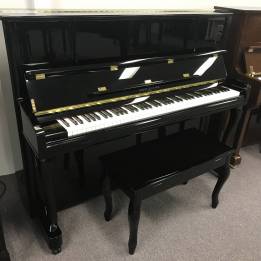
Buying a piano can be a challenging undertaking if you don’t know where to start, or what to consider. Luckily, we’ve compiled a few handy tips to provoke thought when you’re thinking of buying! Gary can also help you along the way, so feel free to get in contact.
Determine where the piano is to be positioned in the home.
It needs to be away from sunlight and weather influences. Preferably on an inside wall in a room with moderated temperature. If this can’t be done, the piano may deteriorate at a faster level. There are things that can be done to look after the piano – a service that we offer is fitting a Piano Life Saver System to maintain the piano in a stable climatic environment.
Judge what size piano will acoustically match the room.
With new technology, many of the new smaller pianos (121cm) will out-perform the older big pianos (131cm). So, size comparison is no longer an accurate overall guide. Gary is happy to inspect the room and help with advice on the best- sized piano for your needs. Or just measure your room and draw a simple plan. Bring this with you to our selection center!
What colour choice will suit your furniture?
Remember that you keep a good piano in the family for generations. Do you have red toning or brown. Would black or Ivory be better? If you really want to match the piano with other furniture, bring a colour card or piece of furniture (e.g. draw) or something to help guide you on your colour selection.
Establish the comfort and performance level.
It’s important to think about who will be using the piano. If it will be in the family being used to teach children for ongoing generations, or will it be a student learning how to play the piano at performance level? What level of progress does this student require. Most piano vendors will avoid this most essential element! Many budding musicians do not develop dynamic sensitivity in their playing due to mono-sound pianos.
When you’re browsing in-store, asking questions about the comfort and performance level of each piano will help your vendor recommend the best product and brand for your use.
Think about the real cost of a good piano.
If you’re a student learning how to play the piano when you add up the cost of lessons (approx. $30 per lesson pwk), transport (approx $10 pwk), books (approx $50 per term) and time (about an hour per lesson), this equates to approximately $500 per 10 weeks term. Over the years of developing enjoyable piano playing you can see that the cost of a good piano over time is the least expensive part of the equation. Remember, a professional piano retailer also shares in the cost, as he should provide good technical and tuning service and warranty assistance to you on an ongoing basis.
Thinking about testing out a few Pianos?
Gary would be happy to show you a range of Pianos that are sold at our showroom. Contact Gary now to show your interest.
